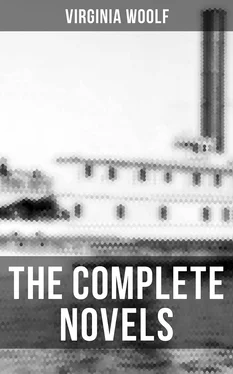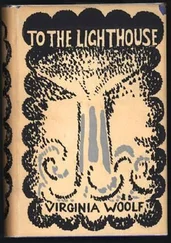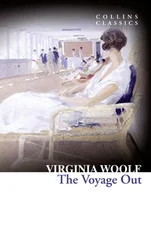“I come from Woking, Mr. Popham. You may well ask me, why Woking? and to that I answer, for perhaps the hundredth time, because of the sunsets. We went there for the sunsets, but that was five-and-twenty years ago. Where are the sunsets now? Alas! There is no sunset now nearer than the South Coast.” Her rich and romantic notes were accompanied by a wave of a long white hand, which, when waved, gave off a flash of diamonds, rubies, and emeralds. Ralph wondered whether she more resembled an elephant, with a jeweled head-dress, or a superb cockatoo, balanced insecurely upon its perch, and pecking capriciously at a lump of sugar.
“Where are the sunsets now?” she repeated. “Do you find sunsets now, Mr. Popham?”
“I live at Highgate,” he replied.
“At Highgate? Yes, Highgate has its charms; your Uncle John lived at Highgate,” she jerked in the direction of Katharine. She sank her head upon her breast, as if for a moment’s meditation, which past, she looked up and observed: “I dare say there are very pretty lanes in Highgate. I can recollect walking with your mother, Katharine, through lanes blossoming with wild hawthorn. But where is the hawthorn now? You remember that exquisite description in De Quincey, Mr. Popham?—but I forget, you, in your generation, with all your activity and enlightenment, at which I can only marvel”—here she displayed both her beautiful white hands—“do not read De Quincey. You have your Belloc, your Chesterton, your Bernard Shaw—why should you read De Quincey?”
“But I do read De Quincey,” Ralph protested, “more than Belloc and Chesterton, anyhow.”
“Indeed!” exclaimed Mrs. Cosham, with a gesture of surprise and relief mingled. “You are, then, a ‘rara avis’ in your generation. I am delighted to meet anyone who reads De Quincey.”
Here she hollowed her hand into a screen, and, leaning towards Katharine, inquired, in a very audible whisper, “Does your friend write ?”
“Mr. Denham,” said Katharine, with more than her usual clearness and firmness, “writes for the Review. He is a lawyer.”
“The clean-shaven lips, showing the expression of the mouth! I recognize them at once. I always feel at home with lawyers, Mr. Denham—”
“They used to come about so much in the old days,” Mrs. Milvain interposed, the frail, silvery notes of her voice falling with the sweet tone of an old bell.
“You say you live at Highgate,” she continued. “I wonder whether you happen to know if there is an old house called Tempest Lodge still in existence—an old white house in a garden?”
Ralph shook his head, and she sighed.
“Ah, no; it must have been pulled down by this time, with all the other old houses. There were such pretty lanes in those days. That was how your uncle met your Aunt Emily, you know,” she addressed Katharine. “They walked home through the lanes.”
“A sprig of May in her bonnet,” Mrs. Cosham ejaculated, reminiscently.
“And next Sunday he had violets in his buttonhole. And that was how we guessed.”
Katharine laughed. She looked at Ralph. His eyes were meditative, and she wondered what he found in this old gossip to make him ponder so contentedly. She felt, she hardly knew why, a curious pity for him.
“Uncle John—yes, ‘poor John,’ you always called him. Why was that?” she asked, to make them go on talking, which, indeed, they needed little invitation to do.
“That was what his father, old Sir Richard, always called him. Poor John, or the fool of the family,” Mrs. Milvain hastened to inform them. “The other boys were so brilliant, and he could never pass his examinations, so they sent him to India—a long voyage in those days, poor fellow. You had your own room, you know, and you did it up. But he will get his knighthood and a pension, I believe,” she said, turning to Ralph, “only it is not England.”
“No,” Mrs. Cosham confirmed her, “it is not England. In those days we thought an Indian Judgeship about equal to a county-court judgeship at home. His Honor—a pretty title, but still, not at the top of the tree. However,” she sighed, “if you have a wife and seven children, and people nowadays very quickly forget your father’s name—well, you have to take what you can get,” she concluded.
“And I fancy,” Mrs. Milvain resumed, lowering her voice rather confidentially, “that John would have done more if it hadn’t been for his wife, your Aunt Emily. She was a very good woman, devoted to him, of course, but she was not ambitious for him, and if a wife isn’t ambitious for her husband, especially in a profession like the law, clients soon get to know of it. In our young days, Mr. Denham, we used to say that we knew which of our friends would become judges, by looking at the girls they married. And so it was, and so, I fancy, it always will be. I don’t think,” she added, summing up these scattered remarks, “that any man is really happy unless he succeeds in his profession.”
Mrs. Cosham approved of this sentiment with more ponderous sagacity from her side of the tea-table, in the first place by swaying her head, and in the second by remarking:
“No, men are not the same as women. I fancy Alfred Tennyson spoke the truth about that as about many other things. How I wish he’d lived to write ‘The Prince’—a sequel to ‘The Princess’! I confess I’m almost tired of Princesses. We want some one to show us what a good man can be. We have Laura and Beatrice, Antigone and Cordelia, but we have no heroic man. How do you, as a poet, account for that, Mr. Denham?”
“I’m not a poet,” said Ralph good-humoredly. “I’m only a solicitor.”
“But you write, too?” Mrs. Cosham demanded, afraid lest she should be balked of her priceless discovery, a young man truly devoted to literature.
“In my spare time,” Denham reassured her.
“In your spare time!” Mrs. Cosham echoed. “That is a proof of devotion, indeed.” She half closed her eyes, and indulged herself in a fascinating picture of a briefless barrister lodged in a garret, writing immortal novels by the light of a farthing dip. But the romance which fell upon the figures of great writers and illumined their pages was no false radiance in her case. She carried her pocket Shakespeare about with her, and met life fortified by the words of the poets. How far she saw Denham, and how far she confused him with some hero of fiction, it would be hard to say. Literature had taken possession even of her memories. She was matching him, presumably, with certain characters in the old novels, for she came out, after a pause, with:
“Um—um—Pendennis—Warrington—I could never forgive Laura,” she pronounced energetically, “for not marrying George, in spite of everything. George Eliot did the very same thing; and Lewes was a little frog-faced man, with the manner of a dancing master. But Warrington, now, had everything in his favor; intellect, passion, romance, distinction, and the connection was a mere piece of undergraduate folly. Arthur, I confess, has always seemed to me a bit of a fop; I can’t imagine how Laura married him. But you say you’re a solicitor, Mr. Denham. Now there are one or two things I should like to ask you—about Shakespeare—” She drew out her small, worn volume with some difficulty, opened it, and shook it in the air. “They say, nowadays, that Shakespeare was a lawyer. They say, that accounts for his knowledge of human nature. There’s a fine example for you, Mr. Denham. Study your clients, young man, and the world will be the richer one of these days, I have no doubt. Tell me, how do we come out of it, now; better or worse than you expected?”
Thus called upon to sum up the worth of human nature in a few words, Ralph answered unhesitatingly:
“Worse, Mrs. Cosham, a good deal worse. I’m afraid the ordinary man is a bit of a rascal—”
Читать дальше












